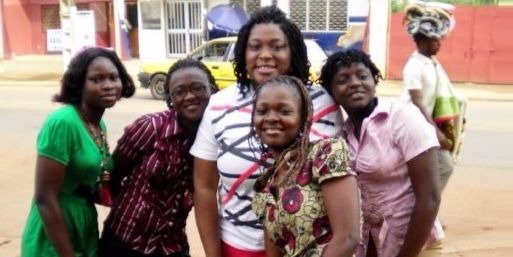
Callie Frye and colleagues in Cameroon.
In Cameroon, Callie Frye noticed how deaf and hearing people often sat side by side on the streets selling food, clothes, jewelry, and other items that they made. Whatever their skills were, and regardless of disability status, they had created individual businesses and lived off of them. This impressed her in much the same way that locals came to understand the opportunities Callie has in her life in the United States. Callie was in the country for ten weeks to intern with the Cameroon Deaf Empowerment Organization and volunteer with the private Kumba School for the Deaf.
“‘How is a black person’s life in America?’ They asked me a lot of questions about that. I said my life is different than it is for white Americans, but I’m successful, I’m motivated, and I’m enthusiastic in how I’ve gone through my life.” They were quite shocked to find out that Callie and other deaf people can drive in America, and that Callie had flown to Africa alone as a woman without a male chaperone. Callie noticed again and again that male students in Cameroon tend to sit in the front while the female students sitting behind them receive less attention. She observed that the deaf adults were the laborers and teaching assistants rather than the teachers at the schools for deaf children.
“Not all the hearing teachers knew sign language, which is why they invited me to be part of their hiring committee to find more teachers proficient in sign language.” She also worked to teach basic subjects to deaf children in the summer program, spread awareness about the rights of people with disabilities on an international level, and train adults and teachers about HIV/AIDS prevention and health education. “All of the students were kind of unaware about what was outside of Cameroon. For myself, I had early exposure to international subjects because my teachers and dorm supervisors at the Indiana School for the Deaf would talk about what the world looked like. I would think to myself, ‘I want to travel.’”
As the first person in her family to explore beyond the United States, Callie whetted her appetite for travel with three months in Italy before starting her bachelor’s degree at Gallaudet University. In subsequent years, her travels continued, with trips to many other regions and for study abroad in France, as did her love of learning foreign languages. “I’m learning Russian online. I don’t attend a class because the teacher is speaking Russian, so it is hard to find an interpreter who knows English, Russian, and American Sign Language. I decided, with teacher approval, I would follow through on the lessons and tests, but the auditory components are removed.”
Her initiative to make access work also benefits her when connecting with hearing and deaf people from around the world. In Cameroon, Callie used a combination of American and French Sign Languages when communicating with the deaf community, and she connected with hearing people through gestures or by typing in French on her cell phone or computer. With a graduate degree from DePaul University in International Public Service, Callie aspires to work with international refugees overseas. She feels she will have much to offer to refugee communities based on her years bridging communication gaps. “When I provide workshops or in general help to explain things for people, I am interactive, provide demonstrations, and add some humor to help hearing and deaf refugees work through communication barriers.”
Callie has focused on and raised attention about inclusion in a variety of settings, from hospitals in Cameroon to the U.S. disability and relief organizations she interned with. Her success is partly founded on the simple discovery she made at that Cameroonian market: When people with and without disabilities work side by side, everyone is stronger.
Reprinted with permission of Global Ties U.S. Member Mobility International USA from miusa.org/resource/story/callie.
